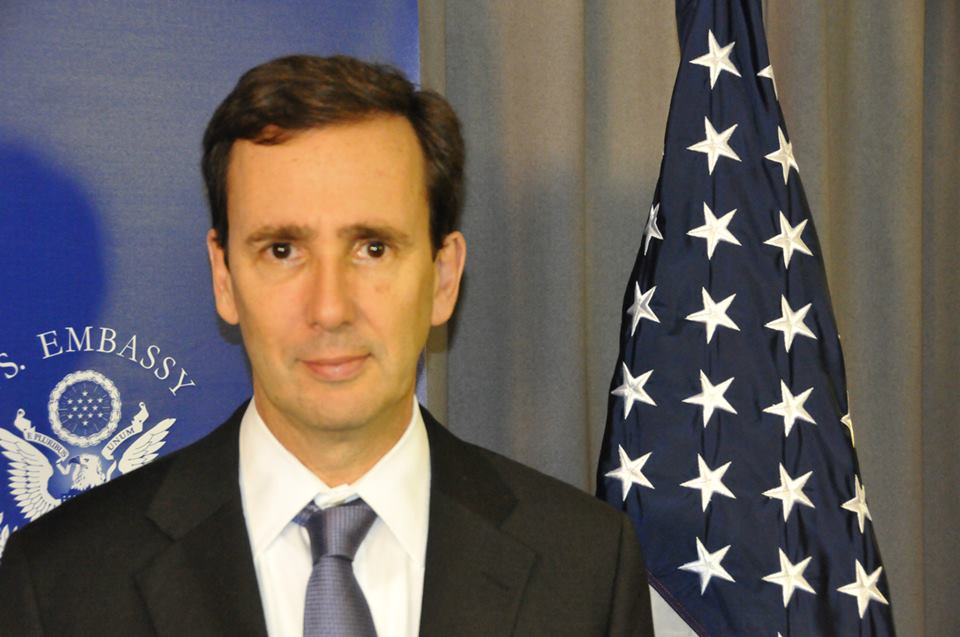Baku, Azerbaijan, June 29
By Dalga Khatinoglu - Trend:
Despite the remaining gaps between Iran and the six world powers, long-term extension of nuclear talks is improbable, the U.S. State Department's Persian Language Spokesperson Alan Eyre who is a member of the U.S. nuclear negotiator team said.
Iran and the group P5+1 (the US, UK, France, Russia, China, and Germany) are holding the intense talks to hammer out a comprehensive nuclear deal by the end of June. The sides reached a framework nuclear deal in the Swiss city of Lausanne on April 2.
All parties are committed to reach an inclusive and sustainable agreement, Eyre told Trend June 28.
"This is a good opportunity which should not be lost. The negotiators have been pursuing intense and non-stop talks for two weeks to resolve remaining differences," he added.
However the senior diplomat underlined that some main differences and gaps are still in place.
"Although technical solutions are available for these problems, but some tough political decisions should be taken over the next few days to reach a favorable agreement, i.e. an agreement within the Lausanne agreement," he underlined.
Eyre also said that some foreign ministers from the P5+1, plus the high representative of the European Union for foreign affairs, Federica Mogherini, will join the talks in coming days to assess the general progress and to consult and confer, as well.
The direct and continuous contacts between negotiators and their heads of governments are necessary in this stage, he said.
Eyre further said that the period of the diplomats' staying in Vienna is unclear, adding perhaps they will move between Vienna and their capitals in the coming days.
While responding to a question about possible extension of the talks, Eyre said that the parties still seek to reach the intended deal before June 30.
"It is likely that some extra days may be required as it was in Lausanne, but there is no need to have a plan on a long extension and there is no mention of it," the senior diplomat added.
Adequacy-seeking rather than excessive demands
The US diplomat also touched upon Iranian officials' comments which say "Western excessive demands" are the problem preventing a deal.
I have frequently heard this phrase "excessive demands" about the P5+1 demands, but the reality is that the better phrase is "adequacy-seeking," he stressed.
The global community greatly worried about the peacefulness of Iran's nuclear program because of the country's lack of commitment to nuclear obligations and a lack of transparency over its nuclear program, Eyre said.
"The Islamic Republic claims that it has not, does not, and will not seek nuclear weapons. We are asking that Iran works sufficiently to establish that claim, that is, it should conduct enough cooperation and create enough transparency to prove that," the US diplomat said.
While commenting on the recent comments of Ayatollah Ali Khamenei, Iran's supreme leader, who outlined Iran's red lines for talks, the US diplomat said that the negotiation teams focused on their work in the negotiation room.
Khamenei on June 23 ruled out freezing of sensitive nuclear work in the country for a long time and said that sanctions imposed on it should be lifted as soon it reaches a final deal with the P5+1. He said that the period of implementation of nuclear agreement shouldn't be 10-12 years, but much shorter.
"All countries have their red lines, outlined by their governments to pursue their national interests and expediency. As the saying goes, the matter is on the knees of the gods," Eyre noted.
"But our solid contention is that there is a consensual approach within the Lausanne framework. What is needed to reach that is to make difficult political decisions."
The senior diplomat also expressed hope that in the few days ahead, all efforts of reaching a deal in Vienna will bear fruit.






